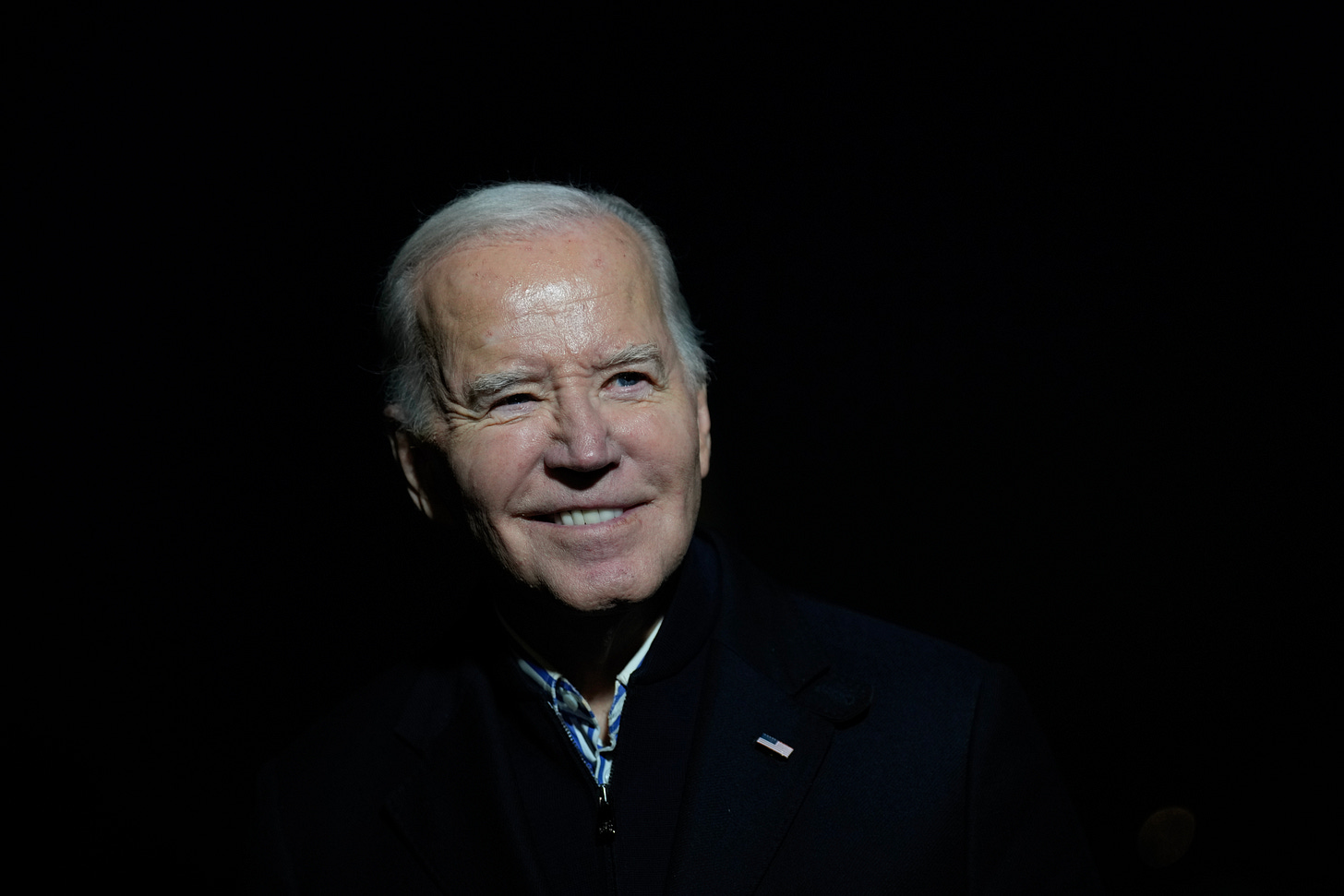Biden doesn't get enough credit for his economic record
His progressive policies have worked, and Dems shouldn't be shy about saying so.
This free edition of Public Notice is made possible by paid subscribers. If you aren’t one already, please consider taking advantage of our holiday special.
President Biden isn’t in an ideal position heading into a presidential campaign cycle where everything is on the line. But to the extent economic issues end up playing a role in the 2024 election, he’s in good shape — and really doesn’t get the credit he deserves.
Biden’s strong economic stewardship hasn’t yet shown up in his approval numbers, which remain quite bad. According to 538’s tracker, he’s currently at 39.1 approve/55.2 disapprove, which puts him 16.1 points underwater. Cable and mainstream news is consumed with his weak polling versus Trump; the horrific ongoing war in Gaza has split his coalition, and especially alienated young voters.
But US economic performance also offers some real reasons for hope. Economic indicators have been strong for some time, and that indicates real gains for Americans.

The benefits of low unemployment and wage growth haven’t boosted Biden’s numbers so far, but they may yet — and even if they don’t, progressives should emphasize their importance if we want to build on them.
Don’t let the GOP demonize stimulus
This month consumer confidence in the US hit a five month high. Surveys found that while consumers were still concerned about inflation, an increasing number said they were planning to buy motor vehicles and major household appliances; those planning to take a vacation reached a three year high. The expectations index, a measure of short-term income, business and market conditions, rose from 77.4 in November to 85.6 this month. That put it over 80, the number economists historically associate with a looming recession.
The bounce in economic outlook is welcome. It’s also overdue. The US economy has experienced a remarkable recovery after the brutal pandemic recession of 2020. America has outperformed peer economies in almost every metric. US inflation in mid 2023 was 2.7 percent compared to 6 percent in France and 8.3 percent in the UK. The US had the strongest economic growth of all G7 nations in early 2023; unemployment was also lower than most G7 countries, including Canada and the UK.
The US has done so well in comparison to its peers because it spent more on the pandemic; Biden’s package, on top of Trump’s smaller effort, added up to the largest stimulus package in the world. Biden prioritized low unemployment over low inflation, and that was a huge boon for the US. But economic sentiment has remained in the doldrums.
The reason for the lag in economic sentiment is unclear. But Republicans and conservatives are eager to use resentment at inflation and at Biden to break labor power, push austerity, and get Trump returned to the White House. It’s important for progressives to make the case for the strength of the economy now if we want to avoid fascism and encourage future administrations to prioritize working people and stimulus during crises.
An economy that prioritizes working people
Before getting into the details of the recovery, it’s important to say that a strong economy doesn’t mean that everyone is well off. Compared to other affluent countries, the US has a weak safety net, high rates of poverty, and high inequality. Currently homelessness is on the rise. Even in a strong economy, many people in the US face great hardship and misery. That’s been the case in the past, and it remains true today.
Nonetheless, a strong economy can improve the lives of many people. And those improvements have been striking under Biden over the last few years.
A note from Aaron: Working with brilliant contributors like Noah requires resources. To support this work, please click the button below and become a paid subscriber.
Economist Claudia Sahm has made perhaps the most detailed case for the current strength of the US economy. In late November, she wrote a post titled, “Most Americans are better off financially now than before the pandemic.” She noted that the unemployment rate has been below 4 percent for more than a year and a half, the longest period where that has been true since the late 1960s.
Black unemployment rates have also dropped dramatically to about 5 percent; that’s one of the smallest gaps between Black and white unemployment on record. Unemployment among people with disabilities has fallen sharply. People typically most shut out of opportunity are seeing real gains.
Long-term low unemployment is hugely beneficial to all workers. Compensation from jobs is the main source of income for most families, especially those who aren’t wealthy, as Sahm points out. Low unemployment also means better jobs — which is why the number of full-time workers has spiked to its highest level ever.
More options for workers has also helped spur a labor renaissance over the last two years, with stunning labor victories in Hollywood, UPS, railroads, and service industries. Most recently the UAW won a sweeping victory against automakers after a 46 day strike; in addition to wage increases, they gained the right to organize electric-vehicle plants, a crucial concession as the industry reorganizes around green energy.
Biden is presiding over a labor renaissance
He's joining UAW workers on the picket line. But his solidarity goes beyond symbolism.
Low unemployment makes labor victories possible; labor victories (and low unemployment) puts upward pressure on wages.
At first during the pandemic, these wage gains were hard to see because of inflation, which was driven in part by supply chain bottlenecks and in part by stimulus spending first from Trump, then (in multiple rounds) by Biden. Economists like former Treasury Secretary Larry Summers insisted that to bring inflation down from its nine percent high, the Federal Reserve would have to raise interest rates enough to cause a recession.
The Fed did raise rates, but inflation came down much more quickly than Summers had anticipated. As a result, real wages have outpaced inflation, especially for low-income workers. The bottom quartile of income earners have seen real wages, after inflation, rise by 4.5 percent between 2020 and 2023.
Why has there been a vibecession?
Wages are now unequivocally outpacing inflation. But economic sentiment has remained dire. Even as more Americans have jobs than ever before in history, the consumer confidence index hit a six-month low in November. Sahm says she’s been savaged on social media when she’s pointed out that strong economic news is out of sync with consumer sentiment. Many people feel that the economy is uniquely bad, no matter what the numbers say.
So why is there this disconnect? One possible reason is the pandemic. The Economist points out that consumer sentiment cratered during the height of covid and never fully recovered. Traumatic and ongoing pandemic issues, including shutdowns, deaths, hospitalizations, and dislocations in industries like nursing and theater could be causing pain not captured in economic sentiment indicators.
It's also true that the more affluent have benefited less; workers in the top quartile have seen real wages fall by 2.4 percent. More affluent people generally have more power to shape media and public narratives. That may disproportionately affect indicators of economic sentiment.
Public Notice is reader supported and made possible by paid subscribers. If you aren’t one already, click below to take advantage of our holiday special.
One big reason for weak economic sentiment, though, is so obvious that it tends to get deemphasized: Republicans and conservatives simply won’t say the economy is good while a Democrat is in office.
Republicans and Democrats are both more likely to say the economy is bad when the opposition is in power. But the partisan bias is 2.5 times stronger for Republicans than Democrats, according to analysts Ryan Cummings and Neale Mahoney. That’s probably in part because Republicans tend to get their news from partisan news sources which feed them dire economic news when Democrats are in office.
Cummings and Mahoney calculated that 30 percent of the gap between economic numbers and economic sentiment could be attributed to Republican bias. That doesn’t explain the phenomenon entirely, but it’s important to take into account.
Consumers aren’t acting like there’s a recession
It’s also worth noting that, while economic sentiment is bad, other measures of consumer attitude are much more positive. For instance, holiday spending this year blasted past expectations. Retail sales were up 3.1 percent — which is what you’d expect if wages were outpacing inflation. New business start-ups are on a near record-setting pace. Again, people don’t usually start new businesses when they think the economy is bad or is going to get worse.
Elections also aren’t consistent with the idea that people hate the economy. Democrats had strong midterm performances in 2022 and again in 2023. When the country is in the throes of a downturn, as in 2010, the president’s party generally does not do well in midterm elections, to put it mildly.
Consumers may tell pollsters they think we’re in a recession. But they aren’t spending money, starting businesses, or voting as if they think we’re in a recession. The strong economic news is consistent with everything people are doing. It’s just not entirely consistent with what they’re saying.
The strong economy gives us a chance to make further gains
The disconnect between action and attitude is disorienting. But it also suggests reasons for hope. People are feeling the effects of a stronger economy and lower unemployment. They are joining unions, engaging in labor actions, and building worker power. They’re also giving Democrats victories which can help secure good economic policy. The recent uptick in consumer sentiment may even lead eventually to a boost for Biden’s approval numbers, and perhaps to Trump being defeated again in 2024.
Following the Great Recession of 2008, President Obama and Congress were reluctant to offer sweeping relief to regular Americans. The result was a grindingly slow recovery and widespread economic misery. In contrast, Biden pushed through repeated rounds of stimulus with the American Rescue Plan, the Infrastructure Investment and Jobs Act, and the Inflation Reduction Act. That may have contributed to painful inflation in the short run. But it’s also enabled a stunning jobs recovery, low unemployment, and a powerful boost for labor.
Why you shouldn't sweat the 2024 polls — yet
Trump and Biden are basically tied. Yikes! But it's not time to panic.
Stimulus is a success; spending on workers in a recession can lead to dynamic economic gains. Recognizing those truths now can help ensure that we respond to future downturns aggressively.
Trump himself embraced stimulus with the CARES act in 2020. But since then Republicans have mostly been insisting that stimulus led to inflation, and they’ve even complained that low unemployment is causing worker shortages. There’s every reason to think that if the GOP gets back into power, they’ll default to tax cuts, reverse pro-labor reforms at the National Labor Relations Boards, and generally try to seize back power for capital. If we don’t want that to happen, we need to make it clear that workers have benefited under Biden, and that we need to build on our gains, not reverse them.
That’s it for today
We’ll be back with more tomorrow. If you enjoy this post, please support PN by signing up. Paid subscribers make this work possible, and right now we’re offering a holiday special of annual paid subscriptions for $40. Click the button below to get full access to the site all the way through the 2024 election for just over $3 a month.








Excellent pieces. Biden doesn’t get credit due regrettably to media laziness. There is a worship of clicks and grievance; they actually see it as easier to chase grievance (think hunting through diners for Trump voters even now). Also, the Dems are lazy and haven’t faught back- I’m concerned they are afraid to. The problem is: if TFG gets back in, life will never be the same. I keep seeing US as Weimar America and hope I’m wrong.
Let's be really clear. Biden has not just done an OK job, but an outstanding performance. Our economy has returned to normal since Trump's lack of economic oversight, and our unemployment has been low and steady for 22 months. Trump was convicted of business fraud and has filed four bankruptcies. In 2019, the U.S. Government spending was up 49.1% from the previous year, while income was down 13%. This was before COVID-19. Anyone or any country who spends roughly 50% more than their income is heading for a disaster. In the second quarter of 2020, the U.S. economy dropped 32.9%. This was the largest drop ever reported. Also under Trump, the FBI reported that violence in the U.S. increase by 30% with 7,700 hate crimes committed. This was the largest single increase in crime in the U.S. in recorded history.
Microsoft has proved that 58% of cyber attacks into the U.S. are from Russia. They have openly admitted to hacking our 2016 election to ensure Trump's win and said this will continue. They have attacked our food supply chains, gas and oil distribution, banking and finance, military and security data bases, and our elections and probably our polls and surveys. Polls sway voters as does massive disinformation. We live in a country that Vladimir Putin has sworn to destroy (The Foundations of Geopolitics) because he blames the U.S. for the demise of the Soviet Union. The Russians want Trump in the White House for one reason - he was probably compromised at some point and is under Putin's control and influence.
Russians use three tools to compromise a foreigner: flattery, money, and women. Every hotel room in Russia where a foreigner stays has spy devices: cameras and listening devices in the walls and the ceilings. This is common practice but not known to most foreigners. With Trump's history with professional women, he was an easy catch. Also, in 2008, Trump Jr. stated that a large percentage of the Trump income comes from Russia. So after filing four bankruptcies in the U.S. and domestic banks refused to loan him money - Trump was doing business with and/or borrowing from Russia. (Elizabeth Graham spent about 20 years living and working in Russia. www.democrazy2020.org)
While the American media spotlight, ever enthralled by the sensationalism of the moment, remains fixated on Trump's legal woes, a crucial and overlooked danger continues to unfold in our country. The influence of Putin's strategies quietly attempts to reshape the trajectory of American politics. The shadow cast by Putin over the landscape of American democracy, and his influence and "control" over Trump, grows larger and darker by the moment. WE ARE SEEING THIS HAPPENING NOW!
It is time to stop spending money and fighting wars abroad, and save our own democracy. Most likely, Putin was involved in the startup timing and weaponization of Hamas. He knew this would draw the U.S. into another war (in Israel), cost us millions of dollars more, distract from his war in Ukraine, and shift the U.S. media (and therefore the American public) from the Ukrainian war to the Israel-Hamas war. Biden has finally brought our troops home from foreign wars, but for how long?
In Janurary there will be a new Substack called: From Democracy to Democrazy. Keep an eye out for it.
Putin intends to destroy our democracy from within - and he is succeeding.